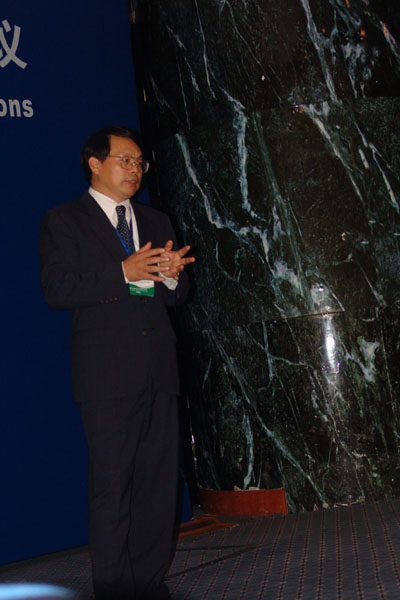By John Sexton
You may think that setting up a wildlife reserve for China's endangered pandas would protect and improve their natural habitat. That was certainly the intention of China's government in 1975 when it set up the world famous Wolong panda reserve in Sichuan province. But results of a major survey indicate the government's good intentions may have been frustrated by processes beyond its control.
Dr Jack Liu of Michigan State University and his colleagues conducted a major study of the 200,000 hectare reserve that is home to 150 wild pandas, approximately ten percent of the estimated total population in the wild. Their conclusions arrived at after conducting interviews with local people, taking field samples, examining government documents and studying satellite data were stark and counterintuitive.
|

|
|
Dr Jack Liu of Michigan State University giving a keynote address to the sixth International Conference on Landscape Ecology and Forest Management held in Chengdu, Sichuan, September 16-22, 2008. |
The establishment of the reserve outlawed commercial logging, which at the time was causing major damage to the panda habitat. But banning logging turned out to be insufficient. Habitats within the reserve classified as highly suitable, suitable, or marginally suitable for pandas, all declined sharply between 1974, the year before the reserve was established, and 1997. Correspondingly, areas regarded as particularly unsuitable for pandas increased sharply over the same period.
Dr Liu said one underlying cause may be the local human population of around 4500 following a global trend towards smaller households. The number of households grew much faster than the rise in population between 1989 and 2001. Smaller households are less efficient than larger households in terms of use of firewood, and gathering of wood for fuel is a significant cause of habitat degradation. In the year 2001 the number of households increased sharply. Dr Liu said this may have been the paradoxical effect of a government subsidy introduced that year to encourage conservation efforts. Since the subsidy was distributed on a per household basis, it encouraged still further household subdivision.
Another probable underlying cause of habitat degradation according to Dr Liu is the rapid growth in the number of tourists visiting the reserve. Tourists require roads and hotels, hydro-electric stations to provide power and the tourist business encourages local inhabitants to stay and others to move to the area. All these developments disturb the panda habitat. One problem is simply the noise that tourists make. Pandas are notoriously timid and shy creatures and the noise from tourist buses or just loud conversations may simply scare them away.
The devastating Sichuan earthquake of May 12 had major effects on the Wolong reserve. Almost all the local houses were destroyed in the quake and a number of local people died. One panda from the reserve's breeding center was killed and the rest were evacuated. On the whole, the effects of the quake have been negative for the pandas; disruption of electricity supplies mean local people are even more dependent on firewood for fuel. People have started to reconstruct homes, often in previously uninhabited areas they consider safer or more suitable than previous locations. The collapse of the tourist trade since the quake has encouraged people to make up their income shortfall by gathering wild mushrooms. All these developments are causing yet further habitat destruction.
From the point of view of the pandas, a positive outcome of the earthquake is the absence of tourists; the road from Sichuan provincial capital Chengdu to Wolong was badly damaged in the quake and what was a four hour journey now takes fifteen. The reserve, in any case, remains closed to visitors.
Dr Liu, who is Rachel Carson Chair in Ecological Sustainability at Michigan State University and a Guggenheim Fellow, presented his findings in a keynote address to the sixth international conference on Landscape Ecology and Forest Management held in Chengdu from September 16-22, 2008.
(China.org.cn September 17, 2008)